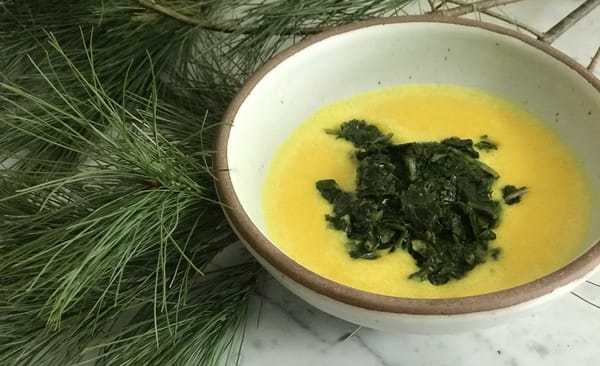Recipe: Turmeric Chickpea Soup With Lemon Spinach
Janet Elsbach calls this a "recovery soup" that's a perfect antidote to the overly rich and sweet feasts of the season.

Janet Elsbach calls this a "recovery soup" that's a perfect antidote to the overly rich and sweet feasts of the season.

The holidays, with their to-do lists and general to-do, their dynamics and demands, are sort of the worst time ever to eat rich and sugary foods and drink alcohol. And yet. From late November to the turn of the year, there we are, tossing back the nogs and cookie platters and gravies and sauces. Let me be the first to say that cream and butter, salt, dessert, and all those other things are delicious and you deserve to enjoy them just as much as they deserve to be enjoyed. But taken out of balance, as this season presents them, these things can be a bit too beaucoup for one’s system. In those rare holiday moments when your diet is under your control (meaning you are not being fed by nor are you responsible for the feeding and satisfaction of large groups of friends and relatives), it can be a relief to treat your body with some gentle care.
In wintry New England, this cannot mean a monastic devotion to green salads and green smoothies, because right now these are both pricey and not constitutionally harmonious with the hibernating impulse that is triggered by the cold and dark. Comfort food is called for by all that this season is and wants from us. Something relatively plain yet full of nourishment, warm and spoonable, and flavorful without a lot of complexity feels like the right kind of food to offer actual comfort.
If you have not yet made stock from your turkey bones, this is the time to do it (although the soup is also nice made with water in place of stock), and if you have resisted cooking your own legumes because it seems like a bother, long dark hours indoors are the ideal time to break down that resistance. Canned beans are a marvel of convenience, but home-cooked ones are acres more delicious. You can swap unsalted butter or olive oil in for the ghee, but know that the Ayurvedic practice of warming spices in ghee, as well as the general deliciousness, really advocate for not subbing. Both High Lawn Farm and Full Moon Ghee make a beautiful, local product that you can feel good about in every way.
Turmeric Chickpea Soup with Lemon Spinach
Serves 4-6
The Soup
2 cups dry chickpeas
Pinch baking soda
2 tablespoons ghee
1½ teaspoons turmeric powder
5 cups turkey or chicken stock or bone broth (substitute water for a vegetarian version)
1 teaspoon salt, or to taste
The Spinach
1 tablespoon ghee
1 clove garlic, grated or finely minced
10 ounces spinach (frozen is fine)
Finely grated zest of half a lemon
½ teaspoon salt
Soak your dry beans overnight in cold water with a pinch of baking soda added. If you are short on time, you can do a quick, 30-minute soak using boiling hot water instead. Drain the beans and dump them into the pot of your pressure cooker (ideal!) or a large cooking pot. Cover with water to a depth of 2 inches above the beans, and either pressure cook for 25 minutes or bring to a boil and then simmer for an hour. Test the beans for doneness (you want a completely tender bean), and continue cooking (another 5 minutes under pressure, or more time simmering) until this is achieved. Drain and reserve.
In a large pot, warm the 2 tablespoons of ghee and add the turmeric. Stir a few times to warm it through. Add the drained beans and toss to coat. Add the broth, and bring to a simmer. Cook for about ten minutes, to let everything meld. Working in batches, and being cautious about how hot liquids expand, use a blender to purée the soup completely smooth. Return to the pot and taste for salt (if your broth is quite salty, you may not need to add much.) Keep warm over a low flame.
In a medium skillet, warm the final tablespoon of ghee over medium heat. Add the garlic and stir a few times until it is fragrant, taking care not to brown or burn it. Add the spinach (and a tablespoon of water if you are using raw spinach), and the lemon zest and salt, and cook for about 5 minutes.
Serve the soup with a scoop of greens on top. The soup keeps well in the fridge or frozen and, like most bean concoctions, improves the next day.